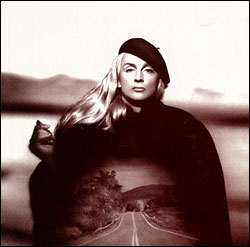SURELY THERE ARE many disparate creative paths to follow once you’ve studied art, ballet, modern dance, trapeze, mime, and voice both here and abroadit’s just that singing “Both Sides Now” in Joni Mitchell drag isn’t the avenue most people would expect you to take. But then, John Kelly didn’t have any expectations, either, when he first began performing as the legendary Mitchell back in the ’80s, after friends in New York’s East Village dreamed up the now iconic Wigstock drag fest and the young punk realized it was the perfect outlet for his lifelong admiration. Though he’s worked steadily as a non-Joni singer, visual artist, and actor, it’s as music’s goddess poet that he’s most acclaimed, winning the devotion of critics and fanslike Natalie Merchant, who asked him to be her opening act on a recent concert tour.
Perhaps less comparable to other drag performers than to experimental artists like sound collagist John Moran, Kelly seems to be searching for the point at which the odd becomes the oddly moving; what seems like a joke is given meaning through ingenuous expression. His Shiny Hot Nights (Thurs., Sept. 11-Sun., Sept. 14, On the Boards, 206-217-9888) is a “staged concert” in which Kelly inhabits Joni on guitar and dulcimer, and is backed by pianist Zecca Esquibelwho in turn plays the part of the late Georgia O’Keeffe. “Joni was friends with Georgia, so I figured I may as well extend the character conceit to the rest of the people onstage,” says Kelly. He talked to us on the phone recently about what we should expect from such an experience, why he’s tired of camp, and, of course, how it felt to finally meet the Master.
 Not camp at all: Kelly (right) and accompanist Esquibel. photo: James Hamilton Not camp at all: Kelly (right) and accompanist Esquibel. photo: James Hamilton |
Seattle Weekly: Did you ever think of just singing Joni as yourself, or was drag a natural outlet for you?
John Kelly: When I first started doing drag, it was a way toI don’t know if I can curse in your paperit was the most fucked-up thing I could think of doing in 1979 [laughs]. And [drag] still wasn’t out of the closet. It wasn’t watered downit was a more potent, socially annoying thing to do. I was living in the East Village painting and doing drugs and being crazy. And I thought this was a really crazy thing to do for channeling one of my demons. Basically, it’s an acting role, you know? It’s a challenge to sing her material with a certain kind of accuracy and to color my voice in a certain way, and it’s also a challenge to transform myself to look like the essence of her.
How difficult is it to sing like her?
It’s always a challenge because I’m singing music from all periods of her career. Early on, she was a soprano, and then, as she smoked, her voice got progressively lower and lower. So I’m belting in a high tenor-type voice, I’m singing countertenor music, which goes through the register break, and I’m singing a lot of mezzo-soprano notes.
You have a big following in New York, but for those of us who haven’t experienced thisyou’re not doing it camp, correct?
No, not allit’s an homage. It’s not camp at all. If anything, I try to go on a fine line between irony and poetry or pathos. I mean, sureit’s ironic, and it’s funny, and part of it is very strange and ridiculous. But at the same time, I try to move people, I try to inhabit the songs, and I try to let the power of the songs be the thing that ultimately emerges.
Do you feel that because you’re in drag people make assumptions about what you’re doing?
Yeah, absolutely, especially in the United States. Americans have a hard time dealing with ambiguitywe want to know what something is, and that’s it. It’s a very limited, unimaginative way of functioning. It’s a lot different in Europe and other countries, I find, because there’s a history of actors and performers doing cross-gender roles. It’s part of their wiring. Whereas here, we immediately relegate it to the column of “camp,” or “no craft,” or “wants to be a woman.” It’s a mind-set that’s very limited, and I try to break that.
Have you had any really bad receptions?
Generally, the audiences I get are really amazing. It’s a cross section, from baby boomers to kids in their early 20s, [and] I’m turning them on to Joni Mitchell’s music, which is great. But there have been a couple of situations where it’s been very dicey. One time I was opening for Natalie [at] the Hard Rock Hotel [in Las Vegas], and it was total meathead landthe Neanderthal crowd had gotten in there. And Natalie was in the wings telling them to shut up, and there were people in the audience screaming “She-male!” It was really kind of horrible. That was like the Roman Coliseum.
What was it like meeting Joni for the first time?
It was a very quiet thing. I was backstage after this crazy night where all the audience knew she was there, and as she got up to come backstage they were yelling, “Real thing! Real thing!” And I’m backstage seeing this woman walk toward me down the hall, and we just basically hugged each other for a while. Because, you know, she’s not a foolshe recognizes the real goods when she sees them. And I’m not in any way trying to flatter myself, I’m just saying that I did her good that night. “Shadows and Light”she was really blown away by that. She was standing up yelling “Bravo!” And she said she cried four times. It was a very strange, surreal moment. It was like sculpting for Michelangelo.








